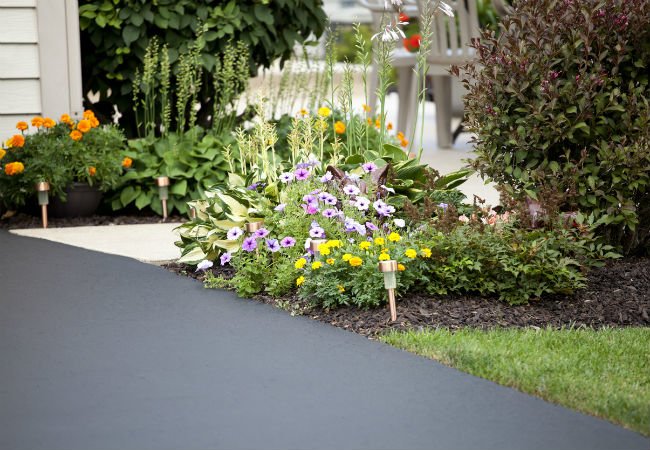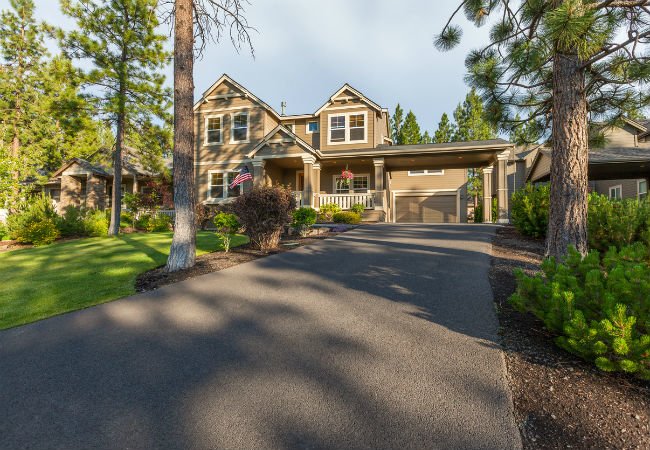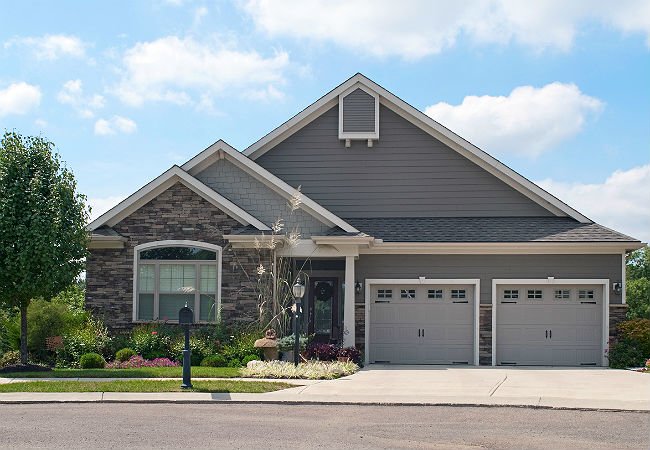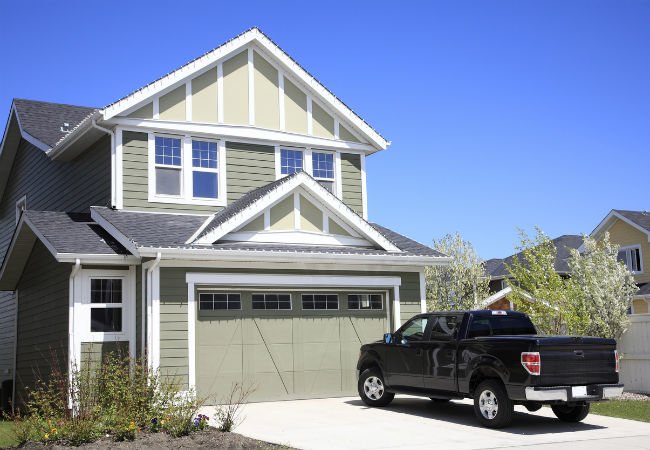

We may earn revenue from the products available on this page and participate in affiliate programs. Learn More ›
If you’ve had enough of the ruts, cracks, and stains of your current driveway and are considering installing a new one, you’re probably debating between the two most common solid materials: concrete and asphalt. While both are laid over a substrate of gravel, and both are basically a mixture of sand and stone, different adhesives are used to hold those components together: tar for asphalt and cement for concrete. The characteristics of those adhesives amount to the differences—both pro and con—between the two popular driveway surfaces.
Both asphalt and concrete create durable, attractive driveways, but there’s more to choosing between them than simply going with the cheaper option. That’s why we’ve faced them off head-to-head—concrete vs. asphalt—with comparisons in seven major categories. So read on to discover whether asphalt or concrete is the winner for your home.
Concrete offers more visual options.
In their most basic forms, asphalt is dark gray to black—hence its common name of “blacktop”—and concrete is pale gray. Unlike asphalt, though, concrete takes well to staining or tinting to just about any color you fancy. You can also stamp patterns into concrete or brush it for a textured finish. Go with concrete if you wish to match your home’s color scheme, recreate the look of brick or another pattern, or prefer a bit of interest in your home’s major entryway. Asphalt is a good choice if you want a streamlined appearance that matches the street.

Asphalt can suffer in the high heat, while concrete performs poorly in extreme cold.
Climate is a major consideration when choosing between asphalt and concrete. If you live in an area with very hot summers, you might find an asphalt driveway becomes gooey or sticky when the temperature soars. The cycle of softening in high heat, then re-hardening once things cool down, can cause asphalt to crack or sag. On the flip side, concrete can buckle, heave, or crack in the coldest winters (especially when you don’t take proper measures to winterize concrete). Plus, the salt used to melt ice can pit, stain, or blotch concrete, leaving ugly marks. And it takes snow and ice longer to melt on concrete than asphalt.
Asphalt requires sealing every few years, but concrete stains more easily.
A few months after installation to allow for full curing, your asphalt driveway will need to be sealed to protect the surface and lengthen its lifespan. You’ll then need to reseal it every three to five years thereafter. (The task is well within the capabilities of most do-it-yourselfers: Pour the asphalt sealer onto your clean, dry driveway, and then use a driveway squeegee to spread it evenly over the entire surface.) While it’s not a must-do for concrete driveways, sealing concrete helps cut down on fading—an important protective measure for a tinted driveway.
When it comes to engine oil, gas drips, rust, and the rugged use driveways typically endure, the dark surface and matte finish of asphalt hides most stains and wear very well. Concrete, however, tends to show every mark and spill, so you’ll need to do more aggressive cleaning and degreasing to maintain its good looks.
RELATED: Driveway Cleaning: How to Remove Just About Any Kind of Stain
Asphalt is easier to repair than concrete but needs it more frequently.
While both asphalt and concrete crack, asphalt tends to deteriorate faster due to its softer consistency. However, it’s fairly easy to repair cracks and damage in asphalt, and the repaired areas generally blend well with the rest of the driveway. It’s also relatively easy to apply a new topcoat of asphalt if the surface is heavily marred or showing its age. Concrete is tougher to repair, and patched spots are usually fairly obvious unless you plan on resurfacing the whole driveway.

Concrete driveways normally last longer than asphalt.
In general, if installed properly in a suitable climate and maintained regularly, your concrete driveway should last 30 to 40 years, while an asphalt driveway is generally good for 20 to 30 years. Neglect to install without an even, stable substrate of gravel—or be careless about proper maintenance—and either type of driveway can fail within a few years.
You can drive on asphalt fairly quickly but must wait for concrete to cure.
You can normally use an asphalt driveway within a couple of days of installation. With concrete, you’ll wait at least a week before it fully cures enough for you to drive on it—something to keep it in mind if street parking is a challenge in your neighborhood!
Concrete costs a lot more than asphalt.
As a rough rule of thumb, a concrete driveway costs around 45 to 50 percent more than an asphalt driveway. According to price site CostHelper, homeowners report an average price of $2.24 per square foot for a new asphalt driveway and $4.36 for a new concrete driveway, but prices can fluctuate drastically depending on where you live, the complexity of the job, and the size of the driveway.

A new driveway is a big expense, whichever way you choose to go. There is no definite “winner” in the battle between asphalt and concrete; the decision comes down to which is best for your climate, your budget, and your tolerance for maintenance needs.
